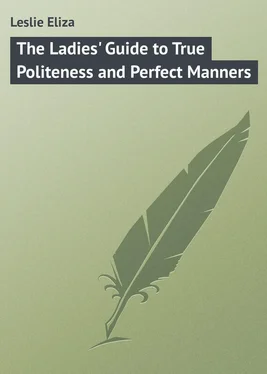Eliza Leslie - The Ladies' Guide to True Politeness and Perfect Manners
Здесь есть возможность читать онлайн «Eliza Leslie - The Ladies' Guide to True Politeness and Perfect Manners» — ознакомительный отрывок электронной книги совершенно бесплатно, а после прочтения отрывка купить полную версию. В некоторых случаях можно слушать аудио, скачать через торрент в формате fb2 и присутствует краткое содержание. Издательство: Иностранный паблик, Жанр: foreign_prose, на английском языке. Описание произведения, (предисловие) а так же отзывы посетителей доступны на портале библиотеки ЛибКат.
- Название:The Ladies' Guide to True Politeness and Perfect Manners
- Автор:
- Издательство:Иностранный паблик
- Жанр:
- Год:неизвестен
- ISBN:нет данных
- Рейтинг книги:4 / 5. Голосов: 1
-
Избранное:Добавить в избранное
- Отзывы:
-
Ваша оценка:
- 80
- 1
- 2
- 3
- 4
- 5
The Ladies' Guide to True Politeness and Perfect Manners: краткое содержание, описание и аннотация
Предлагаем к чтению аннотацию, описание, краткое содержание или предисловие (зависит от того, что написал сам автор книги «The Ladies' Guide to True Politeness and Perfect Manners»). Если вы не нашли необходимую информацию о книге — напишите в комментариях, мы постараемся отыскать её.
The Ladies' Guide to True Politeness and Perfect Manners — читать онлайн ознакомительный отрывок
Ниже представлен текст книги, разбитый по страницам. Система сохранения места последней прочитанной страницы, позволяет с удобством читать онлайн бесплатно книгу «The Ladies' Guide to True Politeness and Perfect Manners», без необходимости каждый раз заново искать на чём Вы остановились. Поставьте закладку, и сможете в любой момент перейти на страницу, на которой закончили чтение.
Интервал:
Закладка:
It is not well to trouble a gentleman with the care of a parcel, unless it is quite small, and he has to pass the door of the house at which it is to be delivered; or unless his residence is in the immediate neighbourhood.
When visiting the shops, if you do not intend to buy at that time, but are merely looking round to see varieties of articles before you determine on what to purchase, candidly say so to the persons standing at the counter. They will (particularly if they know you) be perfectly willing to show you such things as you desire to see, in the hope that you may return to their store and buy of them afterward. At the same time, avoid giving unnecessary trouble; and do not, from mere curiosity, desire such things to be brought to you as you have no intention of buying at all.
The practice that is called cheapening, or beating down the price, is now nearly obsolete. Most tradesmen have a fixed price for every thing, and will not abate.
It is but rarely that you will meet with articles of really good quality on very low terms, unless near the close of the season, when the storekeepers, anxious to get rid of their old stock, generally put down the prices of the goods that are left on hand; knowing that by the return of next season, these will be superseded by things of a newer fashion. Economical ladies, who are not resolutely determined on wearing none but articles of the very latest fashion, may thus supply themselves with excellent silks, lawns, &c. in August and September, at prices far below what they would have given in May or June. And then they can lay them by till next summer. In the same way they can purchase merinoes, mousselines de laine, &c. in January, February, and March, much lower than in November and December. It is best always to buy rather too much than too little; and to have a piece left, rather than to get a scanty pattern, such as will barely hold out, leaving nothing for repairs or alterations. There is much advantage in getting an extra yard and a half, or two yards, and keeping it back for new sleeves. Unless you are small and slender, it is not well to buy a dress embroidered with a border pattern. They are always scanty in width, and have that look when made up. The skirts are never quite wide enough. A tall woman requires as full a skirt as a fat one; else her height will make her look lanky and narrow.
When bespeaking an article to be made purposely for you, ascertain from the maker what will be the cost, and then request him to write down the terms on a card, or a slip of paper, or on a leaf of your tablet. If he says he cannot tell how much it will be, or that he knows not what price to fix on it, or that he cannot decide till after it is finished, it will be safest and wisest for you to decline engaging it, till he has calculated the amount, or something very near it. Persist in this condition being a sine qua non . It is his place to know every thing connected with his business, and to be able to judge of his outlay, and his profits. If you do not insist on a satisfactory answer when making the bargain, you may in the end find yourself greatly overcharged, (as we know by experience;) the price in the bill, after the article is made, and sent home, proving infinitely higher than you would have been willing to give if previously aware of it. In dealing with foreigners whose language is not yours, take especial care that there is a correct understanding on both sides.
When on a visit to a city with which you are not familiar, enquire where the best shops are to be found, and make memorandums of them in your tablets. This will spare your friends the trouble of accompanying you on your shopping expeditions. And if you have a small pocket-map of the town, there will be no danger of losing your way. Except to ladies whose chief delight is in seeing things connected with dress, to go shopping with a stranger is usually very tiresome. Also, the stranger will feel less constraint by going alone; and more at liberty to be guided by her own taste in selecting, and to consult her pecuniary convenience in regard to the price. It is only when you feel that you have reason for distrusting your own judgment, as to the quality and gentility of the articles, that it is well to be accompanied by a person of more experience. And then you will, most probably, be unwilling to fatigue her by going to as many shops as you would like to visit. In most cases, it is best to go shopping without any companion, except, perhaps, a member of your immediate family. Gentlemen consider it a very irksome task to go on shopping expeditions, and their ill-concealed impatience becomes equally irksome to you.
If you have given the salesman or saleswoman unusual trouble in showing you articles which you find not to suit, make some compensation, by at least one or two small purchases before leaving the store; for instance, linen to lay by as a body-lining for a future dress, gloves, mits, a neck-ribbon, cotton spools, pins, needles, tape, black sewing-silk, &c., – things that will always come into use.
Remember that in all American stores, the rule of "first come, first served," is rigidly observed. Therefore, testify no impatience if a servant-girl, making a sixpenny purchase, is served before you – which she certainly will be, if her entrance has preceded yours.
There are still some ladies who think that one of the great arts of shopping, is to disparage the articles shown to them, to exclaim at the price, and to assert that at other places they can get exactly such things infinitely lower. When shopping, (as well as under all other circumstances,) it is best to adhere to the truth. If you really like the article, why not gratify the salesman by saying so. If you know that the price is in conformity to the usual rate, you need not attempt to get it lower, for you will seldom succeed – unless, indeed, on that day the tradesman is particularly anxious to sell, having a sum of money to make up, and being somewhat at a loss. Perhaps then, he may abate something; but if he does not himself propose the abatement, and if he is largely in business, and sure of plenty of custom, there will be little use in your urging it.
If you are a stranger in the city, (Philadelphia for instance,) do not always be exclaiming at the prices, and declaring that you can buy the same articles much lower and much handsomer in New York, Boston, or Baltimore. For certain reasons, prices are different in different places. If an article is shown to you in Philadelphia as "something quite new," refrain from saying that it has been out of fashion these two years in New York. This may injure its sale with bystanders, chancing to hear you. You need only say "that it is very pretty, but you do not want it now."
It is strange, but no less strange than true, that though the distance between New York and Philadelphia is reduced to less than half a day's travel, it takes a year or more, for the New York fashions to get to Philadelphia, and many of them never arrive at all. There are certain dress-makers and milliners in the latter city, who, if you show them any thing quite fresh from New York, will habitually reply, "Oh! we made that, here in Philadelphia, a year or two ago." You need not believe them. Our American ladies derive all their ideas of costume from France; and as New York rejoices in the most extensive and the most speedy intercourse with that land of taste and elegance, the French fashions always get there first. The wonder is that so long a time elapses before they prevail in the other cities. We must say, however, that whatever is fantastic and extreme, is generally modified and softened down in Philadelphia. In provincial towns, and in remote new settlements, we often see a disposition to carry to the utmost a fashion already too showy or gaudy.
When you see on another lady a new article of dress that you admire, it is not ill-manners, (but rather the contrary,) to tell her so. But unless you really desire to get one exactly like it for yourself, and are sincerely asking for information, it is considered very rude to enquire where she bought it, and what was the cost. And it is peculiarly vulgar to preface the enquiry by the foolish words – "If it is a fair question." The very doubt proves that you know the question to be a very unfair one. And so it is. We have never known that expression used except to introduce something rude and improper. Any lady who is asked an impertinent question, would be perfectly justifiable in saying, "Excuse me from answering" – and then immediately changing the conversation. Yet there are ladies who are always catechising others about their dress. You are not bound to give explicit answers to these, or any other questions concerning your personal affairs. Much mischief accrues in society, from some ladies being too inquisitive, and others too communicative.
Читать дальшеИнтервал:
Закладка:
Похожие книги на «The Ladies' Guide to True Politeness and Perfect Manners»
Представляем Вашему вниманию похожие книги на «The Ladies' Guide to True Politeness and Perfect Manners» списком для выбора. Мы отобрали схожую по названию и смыслу литературу в надежде предоставить читателям больше вариантов отыскать новые, интересные, ещё непрочитанные произведения.
Обсуждение, отзывы о книге «The Ladies' Guide to True Politeness and Perfect Manners» и просто собственные мнения читателей. Оставьте ваши комментарии, напишите, что Вы думаете о произведении, его смысле или главных героях. Укажите что конкретно понравилось, а что нет, и почему Вы так считаете.












